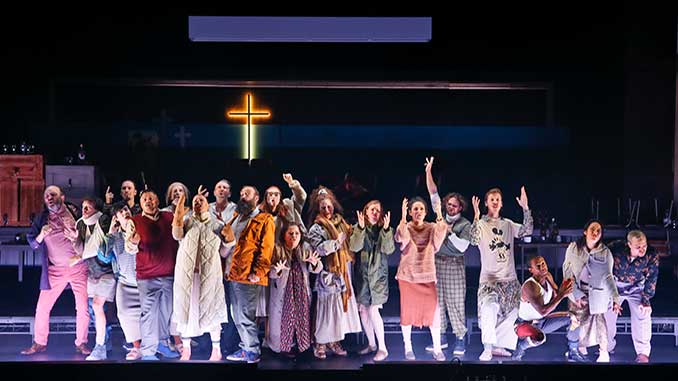 How many others might have been a tad let down by Victorian Opera’s investment in composer Kurt Weill and lyricist Bertolt Brecht’s music sprinkled attempted 3-act attack on capitalism, Happy End?
How many others might have been a tad let down by Victorian Opera’s investment in composer Kurt Weill and lyricist Bertolt Brecht’s music sprinkled attempted 3-act attack on capitalism, Happy End?
At Wednesday’s opening night it seemed like the evening was racing away disappointingly while waiting for the music to strike up in order to pepper or power the work. That’s not to say there isn’t comic entertainment value and some sparky performances as part of director Matthew Lutton’s handsome production.
Originally premiered in Berlin in 1929 and based on a book by Elisabeth Hauptmann, Happy End begins like a play. The first musical number lands around 15 minutes into the first 40-minute act.
That’s The Bilbao Song, one of a handful of numbers that have been plucked out and performed successfully in its own right, assisted by the recording of the great Lotte Lenya.
By Act 1’s end, just three other songs make an appearance before interval. Weill, in fact, wrote the songs independently of the story and, as the program notes explain, “… they were designed to stand alone from the narrative.” Many of them certainly give that impression but they nonetheless have an infectious buzz about them.
Acts 2 and 3 are musically more plump. As musical director and conducting from piano, the indispensable Phoebe Briggs and her band of 8 musicians pump and churn Weill’s mixed musical assortment with buoyancy and intensity.
But Happy End feels more like a play decorated by songs than it does even a musical. What it is or isn’t may be opening a can of worms but there are other performing arts companies the work could more easily be accommodated in.
Intended as a sequel to Weill and Brecht’s The Threepenny Opera – performed back in 2010 by Malthouse Theatre where Lutton happens to be the current Artistic Director – Happy End involves the serendipitous encounter between a bunch of Chicago gangsters and the local Salvation Army branch in an adaptation of the classic tale of the battle between good and evil.
You wouldn’t be wrong in thinking it has the ring of Guys and Dolls to it which was to come, based on two short stories written in the 1930s by Damon Runyon.
The action alternates between Bill’s Beer Hall and the Salvation Army mission on Canal Street – Marg Horwell’s clever two-staged framed set and interesting array of costume designs under Paul Jackson’s effective lighting serve to highlight what a motley lot we are dealing with.
Cold-blooded gang member, murderer and victim hat collector Bill Cracker finds himself out of favour just at the time gung ho mission warrior Hallelujah Lil bursts into his life with an indefatigable desire to save him and his like. Along the way, things neither go his way nor hers but what looked like a disparate mess of circumstances are whipped into an inconceivably glorious outcome.
Brecht’s script facilitates broad room for a shining ensemble and that is certainly on offer. Lutton uses the two levelled demarcated locations with great skill and elicits generous helpings of wit and spontaneity from his cast of numerous well-knowns.
Lucy Maunder puts in a determinedly strong show as a mellifluous, sweetly sung Hallelujah Lil, making Act 1’s The Sailors’ Tango a multi-faceted shining gem. Physically imposing and sandy of voice, Adam Murphy fits like a glove in his portrayal of the gangster Bill Cracker and Ali McGregor is a fabulously flaming and seductress-like force as the female gang leader, The Fly, delivering a smashing beauty with Act 3’s Ballad of the Lily of Hell.
Kurt Kansley glints in his role as the conniving gold toothed gangster, The Governor, and heads The Bilbao Song with well-animated pizzazz. Jennifer Vuletic is superb as the crusty Salvation Army leader, Major Stone, and almost stealing the show on more than one occasion, Euan Fistrovic Doidge is energetically charged and oozing with suavity as the gangster Sam, making a great impression why The Mandalay Song lives on.
There are other fine performances too with no weak link appearing in the cast as they fall into or out of place as a well-choreographed ensemble and slickly dishing up convincingly the American accents and cadence of Michael Feingold’s English adaptation.
Lovers of Weill will be particularly gratified to experience some of his most notable songs in the context they came together for. Happy End has a striking pulse, be that it takes a while for the beat to hit.
My major quibble is with Victorian Opera’s choice. Weill did actually write other music-dramas, call them operas such as his 1947 premiered Street Scene, that opera-lovers might be intrigued to see.
Happy End
Playhouse – Arts Centre Melbourne, 100 St Kilda Road, Melbourne
Performance: Wednesday 23 March 2022
Season continues to 26 March 2022
Bookings: www.artscentremelbourne.com.au
For more information, visit: www.victorianopera.com.au for details.
Image: The Cast of Happy End – photo by Jeff Busby
Review: Paul Selar
